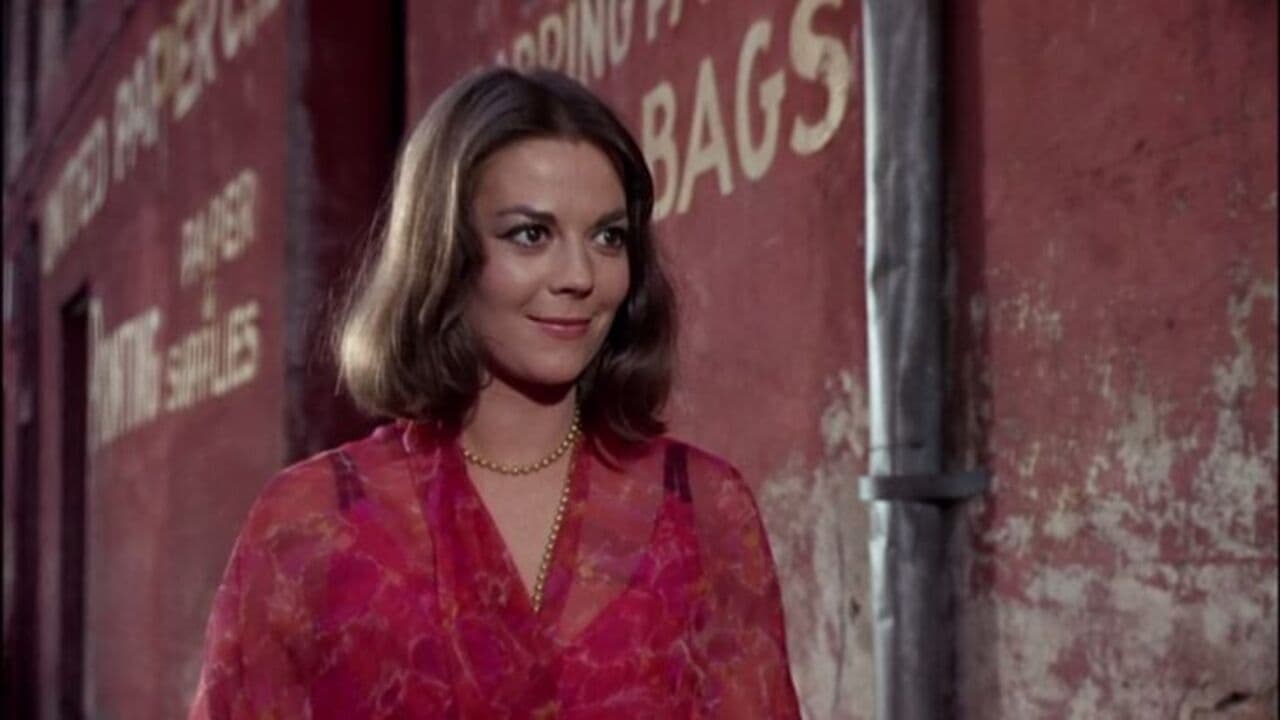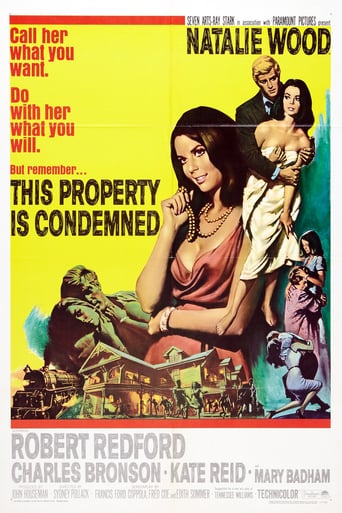

holds up very well. The cast is excellent. Look for a young Robert Blake as one of Alva's admirers, of which there are many. Mary Badham shows how natural and good a child actress she truly was and that her performance in Mockingbird was not just a flash in the pan. I wish she had done more. Charles Bronson is fine as Hazel's boyfriend who is in lust with Wood's character. I think the plot is fine, not sure why so much criticism. It develops the characters and moves along just fine. Robert Redford is solid in his role. He struggles with his job and morality. That is never easy. But Natalie Wood is outstanding. Not only her screen presence is mesmerizing, but her interpretation of her role is a revelation. She is no innocent, yet she is innocent and she portrays that very well. She has never been more beautiful and to me she rivaled Elizabeth Taylor in looks. She was not nominated for an Academy Award that year, but I believe she she deserved it.
... View More"This Property Is Condemned" came towards the end of Hollywood's Tennessee Williams cycle of the fifties and early sixties. By 1966 most of Williams's most famous plays- "A Streetcar Named Desire", "Cat on a Hot Tin Roof", "The Glass Menagerie", etc.- had already been filmed, and this film was based on a much less well-known one-act play from 1946. The story takes place during the depression era of the early thirties in the fictional Mississippi town of Dodson, a major railroad junction. The film takes the form of a frame story in which a girl named Willie Starr (her parents wanted a boy) tells the story of her older sister Alva to a friend. Alva's story is largely shown in flashback, although at the very end the film cuts back to Willie explaining what eventually happened to her sister. Willie and Alva's mother, Hazel, runs the Starr Boarding House in Dodson, their father having deserted the family. (The film's title derives from the fact that by the end of the film the boarding house has fallen into disrepair and has been condemned by the local authorities as unfit for human habitation). Because of the depression, business is not good, and Hazel hopes to exploit the good looks of her elder daughter to improve her financial prospects. She encourages Alva to "get friendly with" (euphemism for sleep with) an older man named Mr. Johnson, one of the guests in her boarding house, who has taken a fancy to her. Johnson is already married, although he is separated from his wife, an invalid, but Hazel is not particularly worried about his domestic circumstances; all she cares about is that he pays good money for his room, and that if Alva is "friendly" to him he will want to stay longer. The flirtatious Alva, however, is not interested in being a pawn in her mother's schemes. She is much more interested in another of her mother's guests, Owen Legate. Part of the attraction is that Owen, a railroad official, is young and handsome, and part is that he is from New Orleans, a city which to the small-town girl Alva seems a very glamorous, sophisticated place, with the same sort of allure that Moscow has to Chekhov's "Three Sisters". Owen, however, is very unpopular with the townsfolk of Dodson because his task is to lay off several railroad employees due to cutbacks made necessary by the depression.One of the attractions of Tennessee Williams adaptations to the film stars of the period was that he created some great characters who gave those stars the chance to show off their acting skills in a way that more standard Hollywood fare did not. "This Property Is Condemned" gave Robert Redford, not the huge name in 1966 that he was to become a few years later, a chance to prove himself a serious actor, just as his friend Paul Newman had done earlier in "Cat on a Hot Tin Roof" and "Sweet Bird of Youth". Redford was also to star in "The Chase", another drama with a Deep South setting, later the same year. This was Redford's second film in his long collaboration with director Sydney Pollack; the first had been "War Hunt". Redford's style of acting was generally very different to that of his co-star Natalie Wood, he being calmer and more controlled, she often more nervous and agitated. They combine well here, however, with their different styles well-suited to their respective characters. Owen is the stronger character, emotionally in control; he finds his duties as an officer of the railroad distasteful but this does not prevent him from discharging them as efficiently as possible. Alva, beneath her flirtatious exterior, is a sensitive young woman, but one who can also be wild and impulsive. There is another particularly good acting performance from Kate Reid as the scheming, domineering and manipulative Hazel, a woman happy to prostitute her own daughter for her own financial advantage. Reid was only 36 at the time she made this film, only nine years older than her supposed daughter Wood, but nevertheless is still completely convincing. It was interesting to see Charles Bronson in something other than an action thriller, although before he became typecast as a tough guy leading man he did sometimes take supporting roles in more thoughtful dramas. ("The Sandpiper" is another example). Like the play upon which it is based, the film, despite some big names among the cast, is also not particularly well known. Having recently seen it for the first time, however, I feel that it deserves to be better known. It is not perhaps a classic of the cinema like "A Streetcar Named Desire" or "Cat on a Hot Tin Roof", but nevertheless contains some fine acting and works well as a touching human drama and love story. 7/10
... View MoreA lot of you might remember Petticoat Junction where a running plot line was Charles Lane's continuing effort to close down the Hooterville Cannonball railroad from Hooterville to Pixley. The run obviously wasn't making money and a lot of the comedy revolved around the residents of Hooterville keeping that line open for their convenience.Tennessee Williams took the same situation about a small southern town in Mississippi where Robert Redford has come to close down the railroad stop in a small whistletown. In fact the main employer of the town seems to be the railroad. They probably would save a lot of money just skipping the town. That won't sit well with the employees, still Redford is charged with handing out the pink slips.A disproportionate amount of them fell on the boarders of Kate Reid's roominghouse where Redford is also staying. Reid has two daughters Mary Badham and the flirtatious and wild Natalie Wood who is a real attraction for all those railroad workers. Even Reid's boyfriend Charles Bronson has an eye on Wood.Wood's looking for Redford to take her out of this dull existence even if he is turning her little hamlet into a ghost town. He's not immune to her charms by any means. But there are a lot of angry and laid off people where they are and he's made enemies. Redford and Wood are good and they get good support from the rest of the cast. But This Property Is Condemend is second tier Tennessee Williams which is usually light years better than most writers. If Wood's character lives, she will be another Blanche Dubois in middle age.Fans of Tennessee Williams who enjoy his southern fried slices of Dixie life will like This Property Is Condemned. But they are not going to see another Streetcar Named Desire here.
... View MoreWalking precipitously on a Mississippi railroad track in a tattered Edith Head gown, carrying a banged-up doll and a rotten banana, teenage "To Kill a Mockingbird" girl Mary Badham (as Willie) meets young "Lassie" owner Jon Provost (as Tom) in a southern accent looking for his lost kite. This is the film's great, poetic framing sequence - the part based on Tennessee Williams. With only a limited number of Mr. Williams' stories ready to become hit films, it's only natural to turn to his smaller one-act plays for material. So, instead of Ms. Badham telling her sister's story, we see it...Carrying pink slips for a small town's depression weary railroad workers, handsome blond Robert Redford (as Owen Legate) arrives in Dodson, Mississippi. He meets storyteller Badham's entrancing elder sister Natalie Wood (as Alva Starr), the belle of the local boardinghouse, after renting her absent father's room. Apparently leased out for indeterminate sex by wicked mother Kate Reid (as Hazel), Ms. Wood fends off amorous advances from fellow child star Robert Blake (as Sidney) and future action hero Charles Bronson (as J.J.). Wood makes herself known to Mr. Redford and they are mutually admired...This film understandably got lost in the wake of "Who's Afraid of Virginia Woolf?" (1966), which immediately set a new standard for this sort of high-strung drama. In hindsight, "This Property Is Condemned" can be appreciated. Sometimes Wood is too jumpy and Redford too judgmental, but the cast is engagingly eclectic. The performance of young Badham is the heart of the story, and we only waver when she is off screen for a long period of time. Badham deservedly won a "Film Daily" best juvenile award for her work; she is stunning. Relatively new director Sydney Pollack is obviously going places.Observe how Mr. Pollack, veteran cinematographer James Wong Howe and the crew artfully coordinate costumes and sets. This is a rare instance where the depression era setting is made colorful without losing drabness. Oscar-nominated for "Seconds" in 1966, Mr. Howe was also worthy of a "Color Photography" citation. The unnoticed Livingston / Evans song "Wish Me a Rainbow" hit several music charts, peaking at #2 in an "easy listening" version by the Gunter Kallmann Chorus. These strengths, especially Badham and Howe, are enough to compensate for a bastardization of Tennessee Williams.********* This Property Is Condemned (6/15/66) Sydney Pollack ~ Natalie Wood, Robert Redford, Mary Badham, Kate Reid
... View More